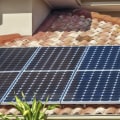Solar panels will not work at maximum output when clouds block the sun and will not produce electricity when sunlight is not available during nighttime hours. Solar panels require sunlight to generate electricity for your home, so they don't work in the dark. Therefore, the simple answer to this question is no. The confusion around night solar work is often due to the concept of solar storage, which allows households to continue to have energy supply during the night.
Solar panels do not produce energy during the night. The photovoltaic cells of solar panels must have sunlight to generate electricity. But that is not the end result. Solar panels offer two indirect night energy solutions.
The answer is no, no. As we mentioned above, solar panels need light, preferably sunlight, to generate energy. Although they can generate some energy from other light sources, such as street lamps and even the moon, production is very low. Because of this, solar panels go into sleep mode during the night, that is, they become inactive and stop producing electricity.
If direct sunlight is not available, solar panels will produce electricity only with indirect sunlight. Well, the reason is that photons in natural light are converted into electricity by solar panels. Other common uncertainties about solar panels revolve around aspects such as cloud cover and shade, reliability in extreme temperatures and weather resistance. Clouds, rain and snow can reduce direct and indirect sunlight, making it difficult to produce solar energy.
These credits can be redeemed to offset any electricity costs you incur on cloudy days or at night, when you can't power your home with solar energy alone. Generating electricity with solar energy has become one of the most efficient, economical and accessible ways for people to reduce their carbon footprint. Any energy produced by your system that you don't use is sent to battery storage or the power grid; we'll talk about this a little later. Solar energy manufacturers have been giving assurances to consumers about the safety of solar panels in such conditions.
While the efficiency of solar panels is better in full direct sunlight, solar panels in cloudy climates or indirect sunlight continue to work. However, as discussed above, solar panels also work during the winter, even with lower efficiency. The most indicative factor of the popularity of solar panels is the cost of electricity, not the amount of sunlight a city sees. Polycrystalline solar panels are more efficient than amorphous panels and can perform well in changing weather conditions.
For example, three types of solar panels, amorphous, polycrystalline, monocrystalline, have different efficiency. This grid connection ensures that you still have power regardless of daily or seasonal variations in solar panel production levels.












Leave a Comment